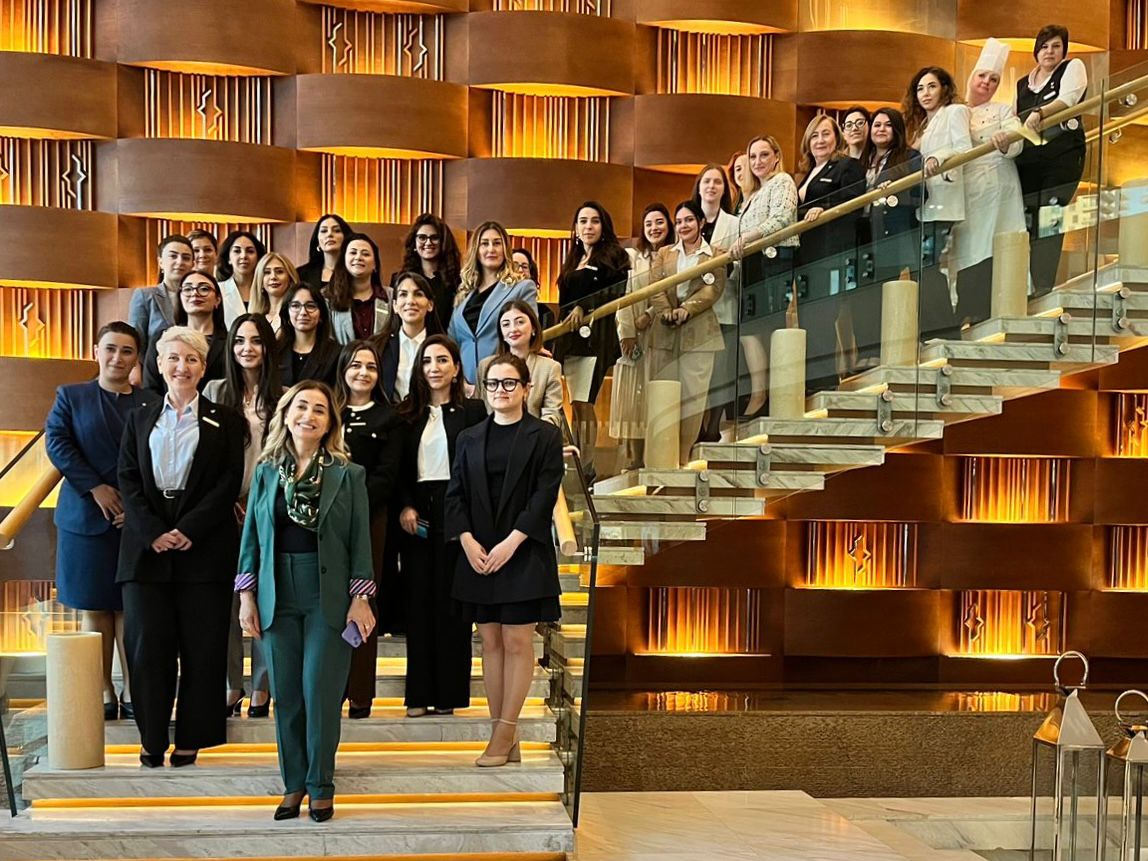
Back to Baku: How one hotel’s training system can reshape hospitality skills in Azerbaijan
A recent ETF visit to Azerbaijan revealed how hospitality-driven learning can inform national VET reforms
The ETF’s recent visit to Baku marked more than a return to country-level cooperation, it revealed how internal training systems can drive national skills development. At the Study in Europe Education Fair, the ETF met with government officials, EU Delegation representatives, and employers shaping the future of vocational education. Among them: Sevinj Purvis, Cluster HR Director at a leading hotel chain, whose approach to staff development offers a practical blueprint for building skills ecosystems from the inside out.
 The hospitality sector is often defined by pace and precision, but Sevinj Purvis is building something slower and deeper: a training culture that turns daily routines into long-term capability. From onboarding drills to green certifications, her team’s approach shows how hospitality employers can shape not just service standards, but national skills systems.
The hospitality sector is often defined by pace and precision, but Sevinj Purvis is building something slower and deeper: a training culture that turns daily routines into long-term capability. From onboarding drills to green certifications, her team’s approach shows how hospitality employers can shape not just service standards, but national skills systems.
The ETF sat down with her in Baku to understand how structured learning, teacher engagement, and recognition frameworks are converging, and what it takes to make vocational education truly job-ready.
From routine to system: Green Skills as a catalyst
Hospitality in Azerbaijan is evolving, and environmental standards are accelerating the shift. What began as informal routines became codified practices under the Green Key certification scheme. Battery collection points, water-saving protocols, and herb gardens moved from a “nice to have” to “standard operating procedure.”
“Once we showed the Ministry of Ecology simple, practical ideas, they amplified them and other hotels copied. That’s when you know skills are becoming a system, not an exception.”
By presenting practical ideas to government institutions, we helped encourage a wider movement among hotels to embrace similar sustainable practices.
Staff now train in micro-skills that build sustainability into daily operations: waste separation, energy monitoring, plastic elimination, and guest communication. These may have started off as one-off seminars, but they’re embedded habits that shape the corporate culture.
Training the trainers: Dual VET in practice
Most cooks come from vocational colleges; front-office and HR roles from universities. But bridging the gap between education and service standards requires more than student placements. This is where Sevinj Purvis expects teacher upskilling.
“If a lecturer has never worked in a luxury hotel, it’s hard to model service at the level guests expect.”
The hotel runs monthly masterclasses for teachers, co-designs practical classes, and hosts structured student rotations. This reflects the ETF’s priority to formalise dual VET systems that embed real workplace experience into vocational pathways.
Recognition, Retention, and Realism
Training is structured and cumulative: 15–30 minutes of daily drills, monthly deep-dives, and an online learning hub with role-based pathways. Staff complete core modules such as data protection, anti-bribery, trafficking awareness, and job-specific learning.

Certificates are printable; some pursue external diplomas.
“Small, constant practice is always preferable to one-off seminars.”
Retention challenges persist: rapid promotion expectations and pay competition from abroad. The hotel responds with transparent career pathways and celebrates internal mobility, even across borders. But for national recognition, equivalence is key.
“We’re happy to map our modules to occupational standards so staff can gain credit or micro-credentials.”
Inclusion and intelligence: Building a skills culture
Women now make up 38% of staff, with growing participation in front-office roles. Food and beverage remains male-dominated, but change is underway, and this often starts with families.
“Sometimes the first stakeholder to convince isn’t the student — it’s the parent.”
Additionally, cultural intelligence is trained explicitly: how to greet guests, read cues, and respect norms. Digital adoption is cautious but proactive. These include phishing simulations, data-protection refreshers, and scenario-based training for future AI tools.
What this means for the ETF and partners
This case reflects the ETF’s broader engagement in Azerbaijan, where dual VET, green skills, and teacher upskilling are emerging priorities. It shows how employers can co-develop training systems that align with national standards, and how ministries and providers can support them.
The ETF’s visit to Baku, including meetings with the Ministry of Science and Education and the EU Delegation, marks a continued commitment to country-specific cooperation. The ETF will continue engaging with national stakeholders to explore how insights from different sectors can inform broader skills development strategies.
Key takeaways and learnings:
For VET providers (directors and teachers):
- Co-teach with industry: Schedule monthly masterclasses on site and rotate teachers through hotels each term.
- Assess micro-skills: Develop rubrics for daily drills, hygiene checks, greeting scripts, waste-sorting. This way, routine practice earns credit.
- Use green standards as learning tools: Leverage certification schemes (e.g. Green Key) to define learner tasks like waste audits, water checks, and sustainable sourcing logs.
For ministries and agencies:
- Formalise dual VET: Establish employer contracts, clear rotation calendars, and minimum on-the-job hours.
- Support teacher placements: Fund short industry stints and offer small grants to employers hosting interns.
- Recognise in-company training: Create occupational micro-credentials that stack into full qualifications.
- Update migration rules: Allow controlled inflow of trainee specialists (e.g. niche cuisine chefs) to raise standards and transfer know-how.
For employers:
- Make learning visible: Post training calendars, print certificates, and track completions to signal progression.
- Coach cultural intelligence: Train staff to read guest cues and adapt service tone, not just technique.
- Retain with realism: Offer clear promotion timelines and lateral learning routes; pair rising talent with mentors.
- Share what works: Document and disseminate simple, replicable practices ranging from battery points to herb gardens.
Did you like this article? If you would like to be notified when new content like this is published, subscribe to receive our email alerts.